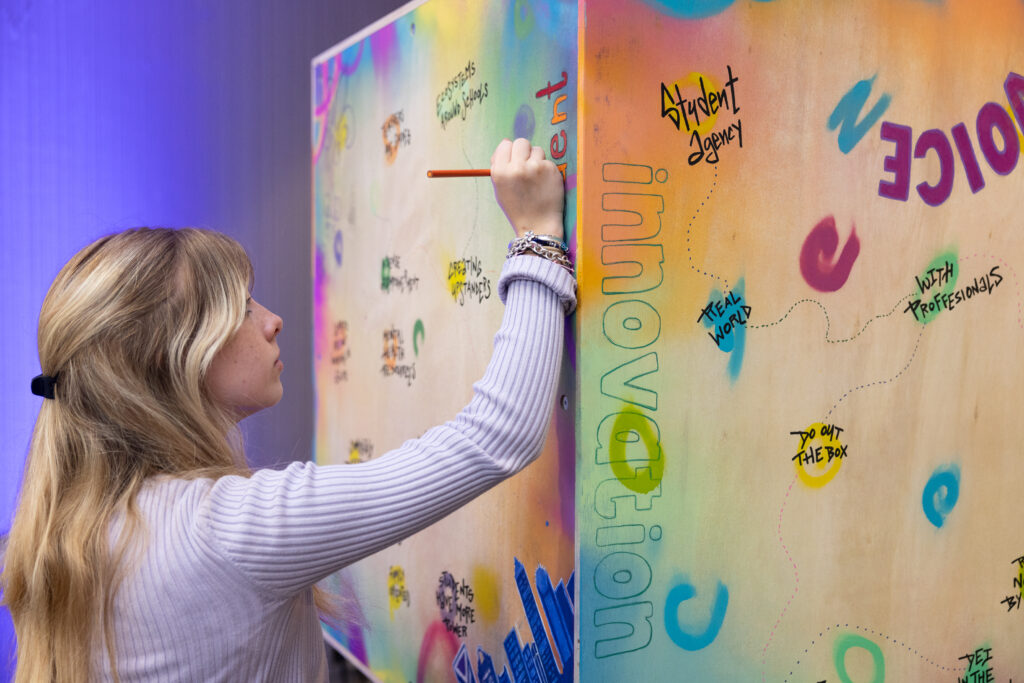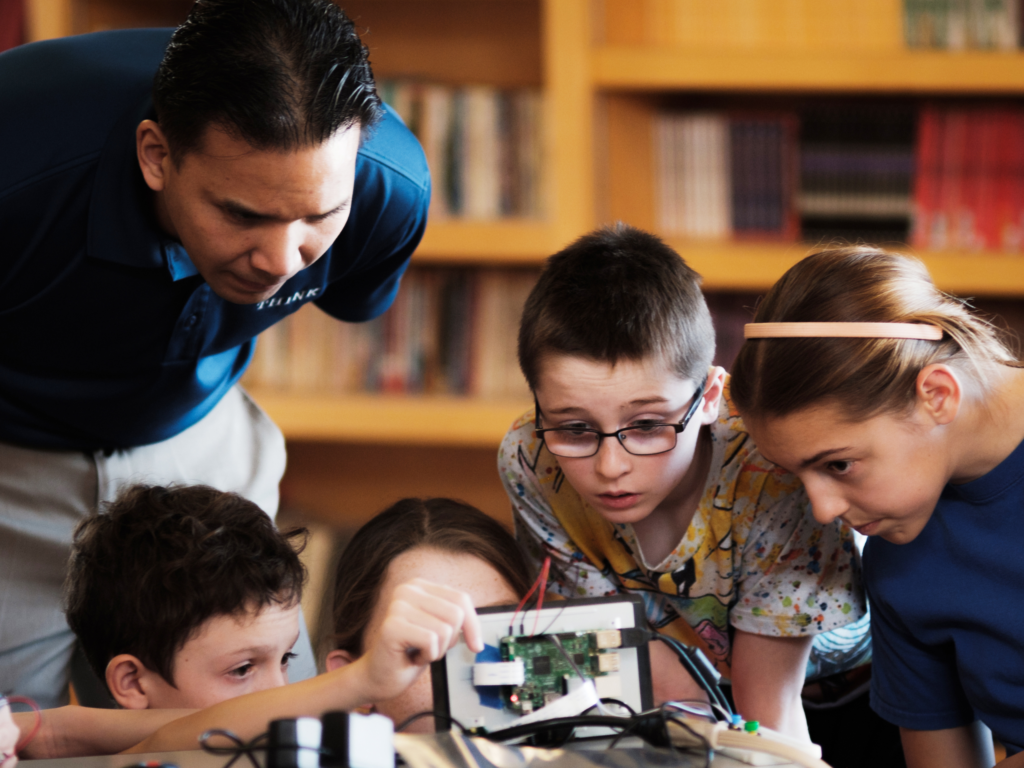By Erin Harless, Senior Manager, Research and Learning, and Nour Abdelmonem, Senior Analyst, Learning Solutions
The public education sector sits at a crossroads. On one hand, school districts have access to unprecedented resources — $190 billion through the Elementary and Secondary Emergency Relief (ESSER) Fund — to help students and educators recover from the pandemic. At the same time, there is growing concern that the education sector could be missing the chance to reimagine our education system. Districts were given a lot of discretion but not much guidance on how to spend the federal funds. As a result, some districts have invested in strategies and interventions without evidence that they will work, according to recent reports.
There is still time for the education sector to course correct. Most of the money has not been spent; districts have through September 2024 to budget the last of their funds. In the meantime, the philanthropic sector can help play a role to ensure federal school relief funds are spent on innovations that dramatically improve conditions and outcomes for all learners.
One way funders can do that is by providing scale capital to organizations and service providers working to address critical needs in schools. Nonprofit organizations did not receive federal money to support the recovery of schools. Without funding to scale their own operations, these organizations are struggling to meet state and local demand for their evidence-based education solutions.
To fill this gap, NewSchools provided $2.5 million in funding in 2021 to five organizations scaling efforts to help educators rebuild from the pandemic. Over the past year, these organizations have leveraged our investments to expand their reach and impact. For example, Education Pioneers, which trains graduate students and early and mid-career professionals to be leaders in K-12 districts, placed 15 leaders who are now playing important roles in districts and charter organizations rebuilding after the worst of the pandemic. But the challenge we shared in 2021 remains the same — the supply of effective solutions is still not meeting demand.
In 2022, we saw an opportunity to continue investing in bold, shovel-ready solutions that districts and states can immediately put to use by leveraging ESSER dollars. After surveying current school leaders and service providers about their needs this year, we found recurring themes for new solutions in four key areas: learning acceleration, innovative talent solutions, mental health, and strategic support for states and districts. We invested $2 million in eight organizations that are helping districts go beyond short-term fixes by addressing root causes of systemic inequities and creating sustainable, enduring innovations.
One such organization, Campus Without Walls, was created in direct response to the pandemic. Its goal is to democratize access to high quality teaching and learning so that zip codes do not determine students’ educational opportunity. By leveraging a technology platform to extend the reach of highly-qualified lead teachers, Campus Without Walls accelerates student learning while also reimagining staffing models in the face of enduring teacher retention challenges. In its pilot year, Campus Without Walls served 45 schools, 26 community-based organizations and 3 universities, reaching approximately 2,000 students across Boston. Now, Campus Without Walls is expanding across Massachusetts, with aspirations to scale nationally. Its leaders are committed to maintaining rigor and quality as they scale and are working with the American Institutes of Research on a four-year study to measure the effectiveness of their model.
Another organization, THRIVE!, interrupts systemic inequities that perpetuate opportunity gaps by partnering with school districts to audit their spending practices. THRIVE! analyzes district budgets with an equity lens, leveraging evidence-based approaches that have been scientifically proven to break cycles of poverty and community feedback to co-create recommendations for budgeting. This approach exemplifies the type of systemic, enduring change that ESSER funds can catalyze. To date, THRIVE! has partnered with three school districts across the nation, reaching almost 90,000 students, and they are actively cultivating school system partnerships in 12 states.
These organizations are united in their commitment to scaling with quality, so that their work meets the immediate needs of schools and districts and reimagines the student and educator experience in the long-term. Our investments are a start. The field needs more funders to step in and fill the gap today by providing capital to more teams of innovators that support districts and schools so that ESSER dollars are spent on equitable, innovative, and durable solutions.
Schools need new approaches that give every learner a chance to flourish and thrive again. By supporting trusted partners delivering these solutions, funders can help schools deliver on the promise of a historic investment.
Meet the Moment: 2022 Grantees
Through its EDge fund, NewSchools invests in innovations that are emerging in response to the pandemic. In addition to Campus Without Walls and THRIVE!, six other organizations received NewSchools funding this year to support school recovery efforts across the country.
- Craft Education System builds data infrastructure and technical assistance capacity so states can identify and proactively address supply gaps in teaching positions. They are currently working with four state education departments and are actively in discussion with 16 additional states. Our investment will support Craft in scaling their supply and demand solutions to radically improve the staffing shortages that states and districts are facing.
- Edunomics Lab is meeting the moment by creating a specific professional development and training program tailored to school board members from the communities that were the hardest hit by the pandemic. This new offering helps school board leaders develop the skills they need to maximize the effectiveness of the federal investments. Our investment will support them in serving school board members representing 100 school districts.
- Opportunity Culture helps schools and districts restructure to extend the reach of excellent teachers and principals. Their innovative talent model provides novice and aspiring teachers with coaching and professional development, incentivizes highly-qualified teachers to stay in the classroom, and pays teachers more for extending their reach to more students. Last year, Opportunity Culture was in 640 schools, reaching 4,500 teachers and an estimated 120,000 students. Our investment will support the development of a technology solution to help them meet the growing demand for their model.
- In response to growing educational and mental health needs for students during the pandemic, Ser Familia created culturally proficient educational and wraparound services to support learning outcomes for Latino children in metro Atlanta. Their comprehensive programming spans a range of school services, including tutoring, school registration, and career exploration, and currently serves 1,000 Latino youth each year in Georgia’s second and third largest school systems. We believe that Ser Familia’s wraparound service model and other similar culturally responsive, holistic models will continue to support students through and beyond the pandemic. Our investment will subsidize a new location and an expansion across Georgia, with the longer-term goal of serving more than one million Latino students in the state.
- Stepmojo’s mission is to radically expand access to high-quality courses and great teachers by blending the benefits of a strong, in-person school community with the best of online instruction. They offer synchronous courses taught by effective teachers who are trained to support student learning and community online, with in-person learning coaches on hand to facilitate. This fall, Stepmojo will serve more than 2,700 students in 40+ campuses across the country, offering 27 unique courses.
- The Teaching Well is reimagining teacher preparation and support with wellness as a central tenant, rather than an add-on. Their innovative model aims to tackle the ongoing challenge of teacher retention, particularly among BIPOC teachers, by prioritizing educator well-being. With their Signature Model for School Wellness, the Teaching Well is working with 60 schools across the Bay Area, and currently piloting a new program, Retention at the Roots, with Mills College’s teacher preparation program.



